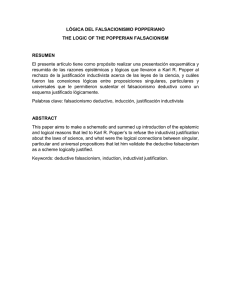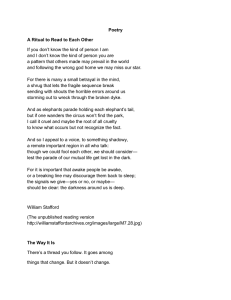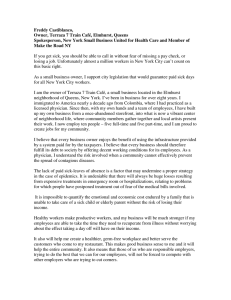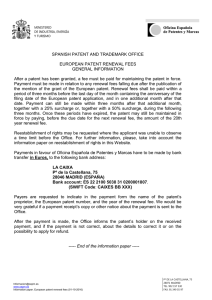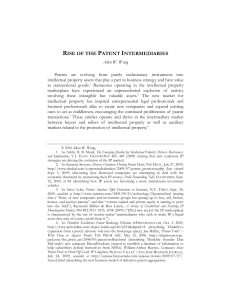Fiscal cliff deal seen as “breakthrough” on some issues
Anuncio
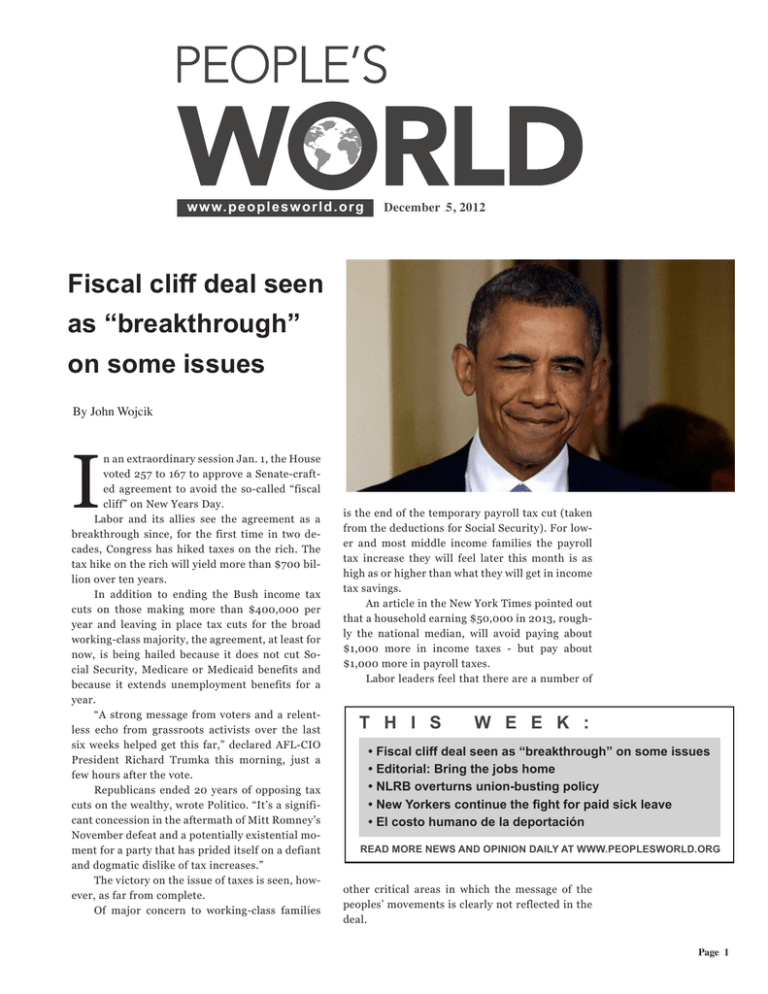
www.pe oplesworl d . o r g December 5, 2012 981 Fiscal cliff deal seen as “breakthrough” on some issues By John Wojcik I n an extraordinary session Jan. 1, the House voted 257 to 167 to approve a Senate-crafted agreement to avoid the so-called “fiscal cliff” on New Years Day. Labor and its allies see the agreement as a breakthrough since, for the first time in two decades, Congress has hiked taxes on the rich. The tax hike on the rich will yield more than $700 billion over ten years. In addition to ending the Bush income tax cuts on those making more than $400,000 per year and leaving in place tax cuts for the broad working-class majority, the agreement, at least for now, is being hailed because it does not cut Social Security, Medicare or Medicaid benefits and because it extends unemployment benefits for a year. “A strong message from voters and a relentless echo from grassroots activists over the last six weeks helped get this far,” declared AFL-CIO President Richard Trumka this morning, just a few hours after the vote. Republicans ended 20 years of opposing tax cuts on the wealthy, wrote Politico. “It’s a significant concession in the aftermath of Mitt Romney’s November defeat and a potentially existential moment for a party that has prided itself on a defiant and dogmatic dislike of tax increases.” The victory on the issue of taxes is seen, however, as far from complete. Of major concern to working-class families is the end of the temporary payroll tax cut (taken from the deductions for Social Security). For lower and most middle income families the payroll tax increase they will feel later this month is as high as or higher than what they will get in income tax savings. An article in the New York Times pointed out that a household earning $50,000 in 2013, roughly the national median, will avoid paying about $1,000 more in income taxes - but pay about $1,000 more in payroll taxes. Labor leaders feel that there are a number of t h i s w e e k : • Fiscal cliff deal seen as “breakthrough” on some issues • Editorial: Bring the jobs home • NLRB overturns union-busting policy • New Yorkers continue the fight for paid sick leave • El costo humano de la deportación read more news and opinion daily at www.peoplesworld.org other critical areas in which the message of the peoples’ movements is clearly not reflected in the deal. Page 1 Labor and its allies see the agreement as a breakthrough since, for the first time in two decades, Congress has hiked taxes on the rich. “Lawmakers should have listened even better,” said Trumka. By extending the Bush tax cuts for families earning between $250,000 and $450,000 a year and by making permanent Bush estate tax cuts exempting estates valued up to $5 million from any tax, you have, in effect, $200 billion in additional tax cuts for the top 2 percent.” Labor and its allies are also warning that, on the downside, the deal paves the way for more Republican “hostage taking.” “The deal simply postpones the $1.2 trillion sequester for only two months and does not address the debt ceiling, setting the stage for more fiscal blackmail, at the expense of the middle class,” said Trumka. “It sets up the right wing House zealots to hold the economy hostage once more,” said OurFuture. org’s Robert Borosage, “while demanding deep cuts in public services, backed by a media frenzy about budget deficits. And while Social Security, Medicare and Medicaid escaped unscathed in this deal, they will be the prime targets in the coming debate.” “Instead of moving to address our nation’s real jobs and investment crisis,” said Trumka, “our leaders will be debating a prolonged artificial fiscal crisis.” Trumka committed the labor movement to a “continued fight for a fairer, more progressive tax system and to protection of Social Security, Medicare and Medicaid.” The deal to avoid the fiscal cliff was brought to the House floor less than a day after its passage in the Senate and approved in the House 257 to 167, with 85 Republicans joining 172 Democrats in voting for it. Voting no were 151 Republicans and 16 Democrats. Interestingly, Speaker John Boehner, who never participates in roll calls, voted in favor. Rep. Eric Cantor of Virginia, the GOP majority leader, and Rep. Kevin McCarthy of California, the number three Republican, voted no. Rep. Paul Ryan, the budget chairman and former GOP vice presidential candidate, supported the bill. John Wojcik is People’s World labor editor. Bring the jobs home PW Editorial O The practices of our high tech and pharmaceutical industries show how patents should be applied to protect the developers of new inventions but the public as well. ne of the main shields protecting greedy corporations who run off with our jobs is patent rights. They are used to deindustrialize the U.S. manufacturing industry. Patents are granted by law and when necessary, the patent laws can be changed to protect the public interest. Patent laws are intended to protect inventors from infringement and theft by others. They were never meant to be used to protect shipping jobs abroad. The practices of our high tech and pharmaceutical industries in particular show how patents should be applied to protect the developers of new inventions and discoveries but the public as well. Our country’s great universities and research laboratories have produced many of these new developments. These institutions operate with large financial support from federal and state government and nonprofit foundations without which they could not function. Under present patent law, taxpayers pay for the research, the patent holders reap the profits. Patents generally run for 20 years and in some cases can be extended. Thomas Jefferson, first U.S. secretary of state and in charge of the patent office, favored very short patent duration. Jefferson, himself an inventor, reasoned that new www. p eo p l esw o rld .o r g discoveries were the product of accumulated past experience and knowledge and the contemporary community in which the inventor lives. He saw inventions as primarily being for the public good and not for the creation of monopoly, as is now the case. Applying Jefferson’s reasoning today, corporations would have to think very carefully before leaving the United States. If they do leave, they should lose their patent rights. In that case, any entrepreneur or the government or a combination of the two could manufacture those products in the U.S. Wherever direct or indirect government money, including tax breaks, is the basis for the development of new products and technologies, we should examine how the government can move to recover its share of the money it put in. Issuance of new patents should be done under new conditions. First, all production under these patents should be done in the U.S. for the duration of the patent. Second, the public interest must be protected. These are new and changing times. They call for new and changing ideas. In fact they have changed throughout our history. They need changing now, to protect and bring back jobs. Page 2 NLRB overturns union-busting policy By Rick Nagin I n a landmark decision Dec. 18 the National Labor Relations Board threw out a 50-year precedent and took away a powerful weapon employers have had to force unions to accept drastic cuts in wages and working conditions. The board, all recess appointments by President Barack Obama, overturned its 1962 Bethlehem Steel decision that had allowed employers to unilaterally impose contract terms when an agreement expires and then stop collecting union dues to pressure a union to accept the “final offer.” That decision, the board stated, was a mistake and inconsistent with labor law. “Unlike a good wine, a mistake does not get better with age,” the new ruling states. While the ruling impacts all future contract negotiations, the NLRB dismissed the actual complaint brought by the National Association of Broadcast Employees and Technicians (NABET) Local 42, an affiliate of the Communications Workers of America. The union’s complaint was dismissed on the grounds that the employer, WKYC-TV, a Gannett subsidiary in Cleveland, had acted in accordance with the then prevailing NLRB policy when it stopped collecting union dues in October 2010. “The ruling does nothing for Local 42,” said Chuck DeGross, the union’s attorney. “It removes a major economic weapon employers have used against organized labor. In effect, we sacrificed for the greater good.” “Unfortunately, it won’t affect us,” said Cathy Watkins, chief steward for the local at WKYC, “but we’re thrilled with the board decision. It certainly reveals Gannett and WKYC for the anti-labor company they are. We hope it will impact them in a way that will restart negotiations.” Because the NLRB dismissed the local’s complaint there are no grounds for the station to appeal the ruling. The case was basically the occasion for the board to issue a new interpretation of labor law, DeGross said. “It’s what’s called ‘judicial activism,’” he said wryly. The battle between the station and the union www. p eo p l esw o rld .o r g has been going on for over three years when WKYC used a wage reopener provision to terminate the existing contract in June 2009, and negotiations began over a new agreement. During this time dues check off continued, but in January 2010, the station unilaterally implemented terms of its final offer, including slashing wages as much as 18%, cutting vacations, sick days and work rules. While negotiations stalled, the station continued to check off dues until early October when, without notice, it stopped and the union was forced to collect dues from members one by one. Many of the 55 members of the unit continued to pay dues but some, feeling defeated, stopped or only paid a portion. “This is what the ‘right to work’ movement is all about.” DeGross said. “The companies have decided the best way to destroy unions is to take away their funding.” Obama sharply criticized the recently successful effort by Michigan Republicans to impose a “right to work” law in that state and the NLRB ruling by his appointees is consistent with that view. “At a time when states are trying to take away the unions’ rights to receive dues in return for services and representation, this decision by the federal government to prevent employers from ending dues check off at the end of contract expiration is timely and greatly welcome,” said Dan Kovalik, associate general counsel for the United Steelworkers. Because the NLRB dismissed the local’s complaint there are no grounds for the station to appeal the ruling. Page 3 local news L o c a l c o n t a c t contact@peoplesworld.org New Yorkers fight for paid sick leave By Gabe Falsetta I n spite of petitions, press conferences by community organizations and city representatives, New York City Council Speaker Christine Quinn continues to stonewall the issue of paid sick leave. We all have a question for the speaker: Speaker, do you get paid when you are out sick? I’ll answer for you. You bet! So why is it that the working class of this city can’t have the very, very small “luxury” of minimal paid sick time? Could it be that once again, doing the right thing takes a back seat to one’s opportunism? I think that is just what it is - pure and simple. But you know, in the end, doing the right thing is what the people of New York City will remember when they go to the polls. The speaker already disconnected herself from the working families of the city when she voted for and pushed others to allow billionaire Mayor Bloomberg to run for a third term; spending over one hundred million dollars of his own money! Thirty-seven members of the Council have signed the bill and labor unions have been outspoken in favor of the bill for paid sick leave. How can it be, that in this day and age when poverty is visiting more and more households and with the pressures of making ends meet, can we not have the most basic paid sick time? Some one million New Yorkers can’t take a day off when they’re sick. The bill would make sure they earn paid sick days and would prevent workers from losing their jobs just because they or their children get sick. And, New Yorkers overwhelmingly favor the proposal, e.g., Quinnipiac Polling Data: 73% in NYC Support Paid Sick Days Legislation. www.p eo p l esw o rl d .o r g El costo humano de la deportación Por Luis Santoyo, AFL-CIO E n la larga y tempestuosa lucha en torno a la reforma migratoria integral, alrededor de 40 jóvenes de entre 7 y 22 años de edad de todas partes de Estados Unidos llevaron sus historias personales de pérdida, miedo e indignación al Congreso el miércoles pasado. Con la esperanza de romper el silencio en torno a las miles de familias siendo separadas, los jóvenes activistas visitaron las oficinas de 50 demócratas y republicanos en el Senado y la Cámara de Representantes para concientizarlos sobre los efectos negativos de la deportación en las familias afectadas. Eliza Morales de 19 años y de Los Ángeles participó en la delegación a Washington, D.C. Años atrás, la madre de Eliza fue detenida en un control de aduanas en camino a recogerla de la escuela. Su madre nunca llegó. No hubo llamadas telefónicas, no hubo mensajes de texto, no hubo correos electrónicos. Su madre simplemente no llegó. Durante las próximas 48 horas, Morales no supo nada sobre la condición o paradero de su madre. Después de dos días de silencio, su madre finalmente pudo llamar a su única hija desde Tijuana, México, a donde había sido deportada. En la conferencia de prensa llevada a cabo poco antes de las visitas a oficinas en el Congreso, Morales comparó lo que sintió al enterarse de lo sucedido a su madre a lo que uno siente al enterarse que un ser querido ha muerto. Hija única de una madre soltera, Eliza se vio obligada a mudarse al norte de California para vivir con su madrina. Cuatro años más tarde, su madre sigue en Tijuana. “Este es un problema muy grande del cual muchas personas no son conn a t i o n a l scientes: la separación de familias a causa de la deportación”, declaró Morales tras su primera visita al Congreso, y a la Costa Este del país. “Quiero que la gente sea consciente de la situación por la cual pasan muchos niños, muchos de ellos más jóvenes que yo”. Morales fue capaz de compartir su historia con los funcionarios nacionales electos como parte de la campaña A Wish for the Holidays (Un Deseo para las Festividades de Fin de Año) de We Belong Together (Pertenecemos Juntos). We Belong Together, a su vez, es una iniciativa de organizaciones cuyo objetivo es el de crear consciencia en torno a “la manera en que las leyes de inmigración injustas afectan a las mujeres, los niños y las familias”. La campaña recolectó 10,000 dibujos y cartas escritas a mano por jóvenes de todo el país, algunos de los cuales entregaron dichos materiales en persona a los 50 miembros del Congreso el miércoles pasado. Junto con las cartas, también entregaron a cada oficina una copia de su “Declaración infantil sobre los derechos del migrante y la unidad familiar”, que en parte asevera: “La pérdida de nuestros padres nos dejó devastados. Estamos enojados por esta injusticia sucedida en un país que dice valorar la familia. Estamos decepcionados por el hecho de que nosotros, los niños, debemos cumplir nuestras promesas, jugar limpio y limpiar nuestro desorden. Sin embargo, el gobierno de Estados Unidos no ha demostrado que puede hacer lo mismo. Amamos a nuestras familias, nos encanta nuestro hogar y tenemos la esperanza de que, en este país, el cambio es posible”. c o n t a c t Editorial: (773) 446-9920 Business: (212) 924-2523 Email: contact@peoplesworld.org Page 4
